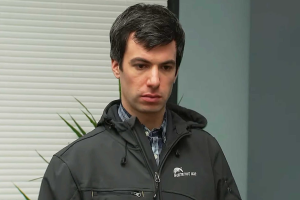A long-awaited report on how Toronto could handle rallies that espouse hate – with an eye firmly on the annual Al-Quds Day event – has met the fate of a substandard restaurant meal: it was sent back for more work.
Following 90 minutes of debate on March 21, Toronto’s executive committee unanimously voted to return the report to city staff.
“We didn’t feel it really addressed the issues we wanted to address,” Ward 6 Coun. James Pasternak told The CJN. “We want a legal framework for preventing and responding to hate rallies, notably Al-Quds Day events and neo-Nazi and white supremacist gatherings.”
He said the “illegal and unapproved” Al-Quds march is “not only an embarrassment and offence because of the anti-Semitic rhetoric, but (organizers) also fail to pay tens of thousands of dollars in road closure fees, solid waste cleanup, TTC re-routing and police services.
“We need a firm policy to protect the Jewish community and the diverse nature of Toronto,” Pasternak said.
Pasternak requested the review in late 2017. The city delayed its scheduled release last June so it could consult with legal experts and other stakeholders.
READ: JEWISH MPP AIMS TO STOP HATE RALLIES AT QUEEN’S PARK
Toronto Mayor John Tory agreed with the need to beef up the report.
“Mayor Tory was not satisfied with the report,” according to his spokesperson, Don Peat. “Ahead of the meeting, he discussed it with Coun. Pasternak and they both felt the report didn’t answer questions that they raised and asked staff to answer. That’s why they asked for those answers to come back to the committee as soon as possible and before this event is held again this year.”
This year’s Al-Quds rally is scheduled for June 1. The revised report is due on May 1.
Authored by Omo Akintan, executive director of the city’s People, Equity and Human Rights division, the report noted that current policies “already prohibit the promotion of hate or discriminatory behaviour on city property” and thus “did not identify any additional capacity to prevent public gatherings that promote hate and incite discrimination from taking place on city property.”
Those policies haven’t stopped Al-Quds rally organizers from meeting on city land. Queen’s Park banned the rally from its property in 2015, so organizers moved, without permits, to a municipal park just north of the legislature. Marchers then traversed the legislative building’s lawn en route to the U.S. Consulate on University Avenue.
Global Al-Quds rallies were begun by Iran in 1979 to oppose Israel’s capture of east Jerusalem in 1967. Past rallies in Toronto have referred to Israel as a “cancer,” called for Israelis to be shot and flown the flags of Hezbollah, a banned terrorist group. Jewish groups had asked police to investigate a music video in Arabic played at the 2017 rally that called for Israelis to be “slaughtered,” stabbed and bombed on buses.
Tory and Pasternak had pointed questions for Dimitri Lascaris, who addressed the March 21 executive committee meeting as a representative of Al-Quds rally organizers.
Regarding anti-Zionist and anti-Israel statements made at past rallies, Tory asked, “Are you saying none of that happened?”
Lascaris replied: “Everything that I have read about what has been said at these rallies has been completely twisted and misconstrued.” Earlier, he said, “No hate crime has ever been committed at an Al-Quds rally in Toronto. It’s as simple as that.”
He said the rally is not against Judaism, but is opposed to Zionism, “which many members in the Jewish community regard to be profoundly inconsistent with the values of Judaism.”
In his deputation, Michael Mostyn, B’nai Brith Canada’s CEO, agreed that the “deeply flawed” report needs more work.
He said it failed to address recovery of costs and did not respond to the city’s request that police determine whether a complaint arose from last year’s rally.
Mostyn called Al-Quds rallies “an annual event drenched in anti-Semitism. The Jewish community feels targeted by this rally.”
Sophie Helpard of the Centre for Israel and Jewish Affairs (CIJA) urged city officials to amend their permit application process to make it clear that those who use city spaces for demonstrations are subject to penalties if they have no permit; that the promotion of hatred or incitement of violence against identifiable groups constitutes a violation and would trigger penalties; and that the city has the right to deny a permit if it believes that event organizers cannot or will not abide by the permit’s terms.
The day before the executive meeting, Roman Baber, MPP for York Centre, introduced a private member’s bill to ban “hate-promoting demonstrations” from the grounds of Queen’s Park.







